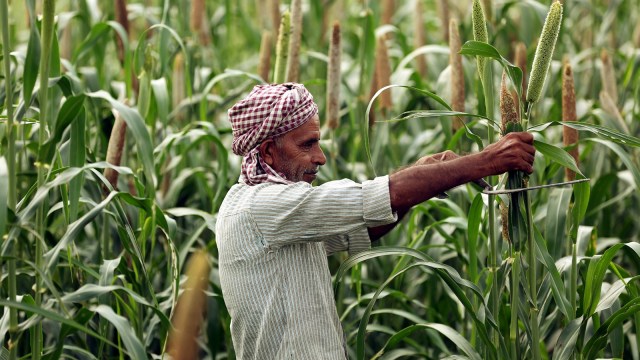Punjab: Delayed supply of seeds under NFSNM; farmers, officers in dilemma
District officials claim that state agri department is pressurising to sell the seeds or face departmental inquiries
 These seeds are vital because farmers can multiply them for future planting. (Express Photo)
These seeds are vital because farmers can multiply them for future planting. (Express Photo)Senior officers across Punjab are raising concerns over chronic delays in the supply of Berseem (green fodder), lentil, gram and wheat seeds, which are meant to be free for flood affected villages and on subsidy for others. These worries come even as the Punjab Agriculture and Farmers’ Welfare Department has recently begun sending these seeds procured under the National Food Security and Nutrition Mission (NFSNM).
The seeds are arriving after the sowing windows of these crops have closed. With farmers not needing the seeds anymore, the district officials are forced to find ways to sell them.
Punjab had demanded for high-yielding seed varieties under NFSNM from the Central government, with the expectation that these would be provided to farmers at subsidised rates.
These seeds are vital because farmers can multiply them for future planting. However, the delivery of these seeds has been significantly delayed, disrupting the sowing seasons.
The state received 12,500 quintals of Berseem seed, and 5,000 quintals (cumulative all districts) of lentil, several 1,000s of quintals of wheat seeds and gram seeds. The state placed a demand under NFSNM for these seeds in the third week of October, even though Berseem sowing in Punjab is usually completed by the second week of October. The ideal sowing window for wheat, gram, and lentils begins at the end of October and continues until November 15. However, district officers argue that the supply of seeds for all these crops arrived too late for timely distribution. This has left little to no demand among farmers for the seeds.
The ideal sowing window for wheat lies between November 1 and 15. Most districts have already completed wheat sowing. Berseem (green fodder) must ideally be sown between September 15 and October 10, and farmers are already harvesting their first cutting. For lentil and gram, sowing typically concludes by November second week.
Documents from Chandigarh indicate that the state had requested 12,500 quintals of Berseem seed worth Rs 12.50 crores on October 23, aimed at covering 50,000 hectares.
By that time, the Berseem sowing window had already closed, and farmers are now well into their first harvest of the season.
The experts and officials report that despite these timelines, the Agriculture Department began sending the seeds only around mid-November, long past the optimal sowing period.
The district-level officials are voicing frustration over the delayed seed supply.
A Chief Agriculture Officer from the Malwa region said, “We requested wheat, lentil, and gram seeds in early October… But the department ignored us. Now, when almost all wheat sowing is finished, they are sending us seeds and pressuring us to sell them…”
Another Chief Agriculture Officer from the Majha region said, “We had sent our requests on time… we are stuck with seeds. We can’t even use the free seeds because there is no space left.”
The situation has led to additional challenges. The officers reported receiving calls from senior officials, from the National Seeds Corporation and the state Agriculture Department, urging them to sell the seeds immediately and deposit the proceeds.
The officers report receiving repeated calls from the National Seeds Corporation and the state Agriculture Department. The senior officials are urging the district officers to sell the seeds immediately and deposit the proceeds.
However, with no demand and no available land for sowing in majority Punjab districts, officials are clueless as to how to proceed.
A Chief Agriculture Officer from the Doaba region said, “Once the seed enters the district under this scheme, it cannot be returned. We’re being pressured to sell it, or face departmental inquiries. But how can we sell seeds when the sowing season is over, and farmers are already harvesting Berseem?”
“Every year, inputs under various schemes arrive two to three months late. Farmers cannot delay sowing just because the department is slow. This delay defeats the purpose of schemes like NFSNM, which are meant to promote high-yielding varieties,” said a senior officer from Ludhiana.
Another agriculture officer said, “We are caught between farmers who no longer need the seed and superiors who insist we sell it or face consequences. This is not planning; it is wasteful and undue pressure on district officers.”
Punjab Agriculture Minister Gurmeet Singh Khuddian was unavailable for comment, as he was attending a program. He was expected to speak on the issue after the event.







